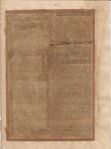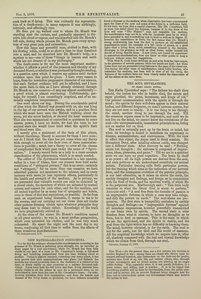< Theosophical Ideas (continued from page 4-196) >
ment that many men lose their souls “even before bodily death;” but it is not new, nor, to me, unphilosophical. He has read Blavatsky’s Isis Unveiled, and praises it. If he will consult what the learned author says in many places throughout both volumes, he will find the subject ably and exhaustively treated, with ample references to authorities. He will find (Vol. I., p. 307 seq.) in a report of a recent discourse of the Rev. Chauncey Giles, one of the lights of Swedenborgianism, that the doctrine of soulless men is a dogma of the New Church. “These creatures,” says the preacher, “with all their graces, rich attire, and brilliant accomplishments, are dead in the eyes of the Lord and the angels, and when measured by the only true and immutable standard, have no more genuine life than skeletons whose flesh has turned to dust.” Especially I commend to him the author’s clear language (Vol. II., p. 369) in describing the gradual absorption of the soul (ψυχη) by the grossly materialistic or sensual mind: “Like the Vampire of the Servian tale, the brain feels and lives and grows in strength at the expense of the spiritual parent. Then the already half-unconscious soul, now fully intoxicated by the fumes of earthly life, becomes senseless beyond hope of redemption. ... It ignores all that cannot be demonstrated by either its organs of action or sensation,... it dies at last completely. It is annihilated. Such a catastrophe may often happen long years before the final separation of the life-principle from the body…. Grim death frees but a soulless corpse; at best an idiot. Unable either to soar higher or awaken from lethargy, it is soon dissolved in the elements of the terrestrial atmosphere.”
My friend Oxon defines the trine of man to consist of “a physical body, a spiritual body, and a particle of the Divine Mind, indwelling, which most call soul, and some spirit.” Our disagreement is at the point I have italicised. We say that this particle of the Supreme Essence overshadows or illuminates, but does not enter into and dwell within man except in those rare instances when a Buddha, or a Jesus, appears on earth. Such men are complete trinities.
He asks me to define the nature of conscience, and says: “Is it pretended that a man who has lost his relations with his spirit has no standard of right and wrong?” No, it is not so pretended. Soul death in the living man does not imply that the unfortunate may not be possessed of far more discernment of the relations of earthly affairs than many not so bereft. They may be very meteors of intellect, brilliant in repartee, radiant in accomplishments, arbiters of fashion and of taste. But with death comes to them night—the extinguishment of all that made up sensible existence. The soul-wreck that is born into the world of spirit—if anything at all remain to be born—is spiritually an idiot, as Madame Blavatsky says, for its whole capabilities for spiritual perception have been absorbed by the vampire, physical brain.
My friend labours to comprehend the distinction between the adept’s exercise of will-power and the medium’s astral spirit’s unconscious, or conscious, agency in the production of phenomena. There is the greatest difference between the two, and therein lies the danger to the medium. The adept, by a whole life’s training, perfects his control of the willpower. Having learnt the great secret of discerning spirits—recommended by Paul, and illustrated by Jesus, and all other Biblical thaumaturgists—the adept’s astral spirit works with, through, and in perfect accord with either pure disembodied spirits or his own immortal spirit— his Αύγοειδης But mediums, lacking the “discernment of spirits,” allow themselves to be worked by multifarious spirits, angels, or spooks—they know not which—as the case may be. When the medium’s astral spirit produces phenomena, it is unconsciously to himself, it is influenced, guided, and compelled by other “spirits,” by foreign wills. He, the automaton; they, the hidden motors. “How,” asks “M.A., Oxon.,” “how are we to know whether it be the medium’s soul, an elementary, or an elemental?” You cannot, except through the study of the occult sciences. Hence the peril that the medium runs in giving his body as a rendezvous for any astral “tramp” to occupy if he find it open and unguarded. We Theosophists raise the note of warning; let him that hath ears, hear—him that hath eyes, see.
New York, January 22, 1878
The Iconoclast and the Cannibal
...
The Soul Revelations
The Katha Upanishad says: “The fathers too shalt thou behold, the heroes too who in battle died, the saints and sages glorified, the pious, bounteous, and kings of old.” Our present communication with the spirits is through the mind; the spirits by their will-force appear in their natural bodies, and different draperies, on man’s nervous system, but they are not seen in reality. It is one thing to see through the mind, another thing to see through the soul. Till the sensuous organs cease to be impressive, and until we do not live on the mind, we cannot know the revelations of the soul—the unimpassionable, immaterial principle in us, living not on matter but on God.
The soul is naturally pent up by the brain or mind, but when its bondage is loosed it manifests its supremacy in dreams, somnambulism, and clairvoyance. With the view to effect this object, the Aryas used to drink somlata. Sir Humphrey Davy, after inhaling nitrous oxide, was changed into a different state. After recovery he said: “Nothing exists but thoughts; the universe is composed of impressions, ideas, pleasures, and pains.” Till we are in a spiritual state we can have no pure cognition. The brain by itself is no power; all its high powers are derived from the soul, and such portions as are undeveloped constitute our animal nature. Particular training calls forth particular powers, but the training which aims at the extinction of our nervous force, and the consequent evolution of the psychic principle, is our best education, as it raises us above the earth, the earthly thoughts and feelings, and brings us in communion with the Soul of Souls, and the spiritual world, of which He is the perpetual sun. Marlborough said: “This little body trembles at what the Great Soul is about to perform.” Antonius said; “A soul free from the tumults of passion is an impregnable fortress, in which a man may take refuge, and defy the powers on earth.” The soul-states are progressive. The first state is tranquillity unshaken by earthly thoughts and feelings—an “impregnable fortress” against all mundane impressions, however powerfully transmitted to our brain even by spirits. The second state is utter freedom from what is concrete, to have no thoughts as to form, but to feed on essences. This is the state in which we see the spirit-land, and the spirits in reality, and the soul from the light within has no difficulty in knowing them. The mind, however elevated, is for the earth. The soul is not for the earth, but for God and His world of essences. All the empirical knowledge which we acquire here is, after all, shadowy compared with the real and eternal knowledge which we obtain from God, through our soul.
Calcutta, January 11, 1878.
<Untitled> (The War)
The War.—At the present time, not a few persons are anxious to involve England in war; among them are classes who thrive upon increased national taxation, also contractors on the look-out for profits, military men tired of an idle life, and various others, who, through certain newspapers, and by divers means, are stirring up an angry public feeling. War, especially when it is not purely defensive, is a great crime, and killing men is murder. It is to be hoped that everything possible will be done by Spiritualists, from the public platform and in private life, to prevent England being dragged into the fray, and to remove from power any Government which may involve the nation in war.
Editor's notes

